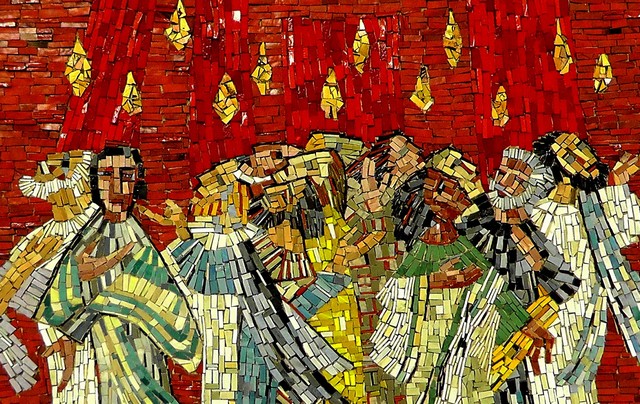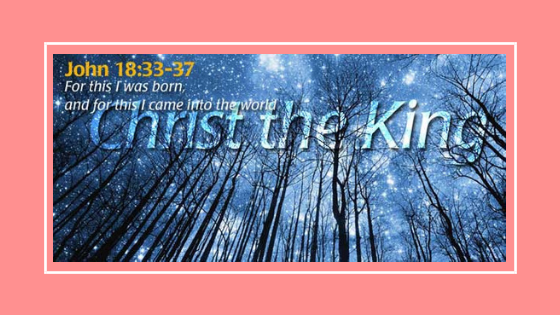Pentecost Sunday (4 June 2017)
Acts 2:1-11; Ps 104; 1 Corinthians 12:3b-7, 12-13; John 20:19-23
Theme: You make the winds your messengers, fire and flames your ministers.
The liturgy of Pentecost is sheer celebration! The solemnity of this feast cannot restrain the amazement, astonishment, even the bewilderment that the reading from Acts proclaims. Yet, in a delicate balancing act, the combination of readings for this Pentecost (in cycle A) reflects a process of growth, which begins in an experience, then moves through reflection / understanding, toward a conviction in faith that is permeated by profound joy. In today’s liturgy the trilogy of Incarnation – Resurrection – Outpouring of the Spirit enters its final act that knows no boundaries of time or place.
The early Christian community’s conviction about receiving the Spirit holds creatively in tension two theological traditions; the contrast between Acts and John reminds us of that. Jesus breathes on his disciples the gift of the Spirit [Jn 20:23-24]. Yet, in Luke 24:49, Jesus states, “ I am sending upon you what my Father promised; so stay here in the city until you have been clothed with power from on high.” From such texts, the Nicene Creed derives its affirmation: I believe in the Holy Spirit who proceeds from the Father and the Son.
We might see creative tension too in Paul’s effusive description of the variety of gifts, services and activities held in the unity of the Spirit, and his marvelous image of the one body of Christ encompassing all of us, in all of our diversity.
Jesus missions his disciples with a gift of the Spirit for a ministry of discernment and forgiveness. In contrast, the experience in Acts is an outpouring of the Spirit, oblivious to language barriers and symbolically accessible to the whole then-known world. In seeking the meaning of that experience, the community saw it as the realization of God’s promise articulated by the prophet, Joel, around 400 BCE, in post-exilic Jerusalem: “I will pour out my spirit on all flesh; your sons and your daughters shall prophesy, your old men shall dream dreams, and your young men shall see visions. Even on the male and female slaves, in those days, I will pour out my spirit” [2:28-29].
It was Shavuoth (the Feast of Weeks), called “Pentecost” by Hellenistic Jews like those in the community of Acts, the fiftieth day after Pessach. As awareness of the relation of Shavuoth to Exodus and Pessach grew, the feast became a commemoration of the Sinai Covenant, especially its Matan Torah, the gift of God’s word, forming the children of Israel into the people of God. Luke subtly captures the significance of this moment in Acts in two images: a sound like the rush of a violent wind and tongues as of fire carry the impact of other theophanies in Jewish tradition: the ruah (wind, spirit) that swept over the waters in creation [Gen 1:2], the burning bush [Ex 3:2], the wind that dried a path through the Sea of Reeds [Ex 14:21-22], the fire in which God descended on Mt. Sinai [Ex 19:18], the pillar of fire that guided the desert journey [Dt 1:33], to name just a few. Unfortunately, in Ps 104, vs. 4 has been omitted; in its simplicity, it tames those powerful images: “you make the winds your messengers, fire and flames your ministers.” What is their message; what is their ministry? They signal the presence and action of the Spirit of God who enables, in the nascent Christian community, the integration of the most distinctive strand of its identity, its witness to Jesus as Lord and Christ (Anointed One, Messiah).
For Reflection and Discussion: : 1. Recall a personal story of growth: from experience, through reflection / understanding, to conviction marked by joy, and the “Word of God” that leads you to the deeper meaning of that experience. 2. What is your affirmation of faith about Jesus now?
Bibliography: Amy-Jill Levine & Marc Zvi Brettler, editors, The Jewish Annotated New Testament (2011), pp. 197-202, 306; Raymond Brown et al., The Jerome Biblical Commentary (1968), pp. 171-2.
This week’s Sunday Gospel Commentary was prepared by
Sr. Diane Willey, NDS, M.A. in Theology, Jerusalem, Bat Kol Alumna 2005, 2006
dianewilley@hotmail.com
[Copyright © 2017 ]
………………….……………………………………………………………………………………
PLEASE NOTE: The weekly Gospel commentaries represent the research and creative thought of their authors, and are meant to stimulate deeper thinking about the meaning of the Sunday Scriptures. While they draw upon the study methods and sources employed by the Bat Kol Institute, the views and conclusions expressed in these commentaries are solely those of their authors, and do not necessarily represent the views of Bat Kol. Questions, comments and feedback are always welcome
……………………………………………………………………………………………………..
Bat Kol Institute for Jewish Studies, Jerusalem
1983-2017
“Christians Studying the Bible within its Jewish milieu, using Jewish Sources.”
gill@batkol.info Website: www.batkol.info

